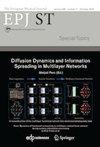The smeared-horizon observer of a black hole
IF 2.3
3区 物理与天体物理
Q2 PHYSICS, MULTIDISCIPLINARY
引用次数: 0
Abstract
Abstract A class of observers is introduced that interpolate smoothly between the Schwarzschild observer, stable at spatial infinity, and the Kerr–Schild observer, who falls into a black hole. For these observers, the passing of the event and inner horizon takes a finite time, which diverges logarithmically when the interpolation parameter $$\sigma $$黑洞视界模糊的观测者
摘要介绍了一类在空间无穷远稳定的Schwarzschild观测者和落入黑洞的Kerr-Schild观测者之间平滑插值的观测者。对于这些观测者,事件和内视界的传递需要有限的时间,当插值参数$$\sigma $$ σ趋于零时,时间呈对数发散。在引力的场论方法中,视界处的行为变得规则,使得度规的质量得到了很好的定义。
本文章由计算机程序翻译,如有差异,请以英文原文为准。
求助全文
约1分钟内获得全文
求助全文
来源期刊
CiteScore
5.10
自引率
10.70%
发文量
313
审稿时长
3-8 weeks
期刊介绍:
EPJ - Special Topics (EPJ ST) publishes topical issues which are collections of review-type articles or extensive, detailed progress reports. Each issue is focused on a specific subject matter of topical interest.
The journal scope covers the whole spectrum of pure and applied physics, including related subjects such as Materials Science, Physical Biology, Physical Chemistry, and Complex Systems with particular emphasis on interdisciplinary topics in physics and related fields.

 求助内容:
求助内容: 应助结果提醒方式:
应助结果提醒方式:


